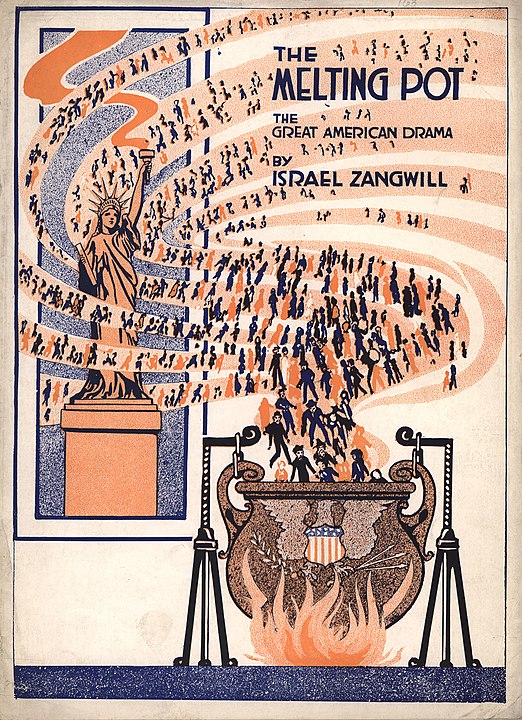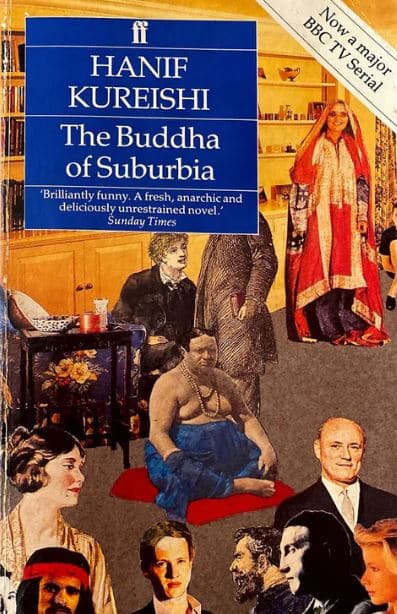Melting Pots, Salad Bowls and Kaleidoscopes: Unpacking Metaphors for Multiculturalism
20 Feb 2024|Elena Violaris
- Research
When individuals or communities migrate to Britain, which aspects of their original culture do they keep, and which do they discard? My research project addresses this question through analyses of contemporary literature, and interviews with second and third generation migrants from different cultural backgrounds.

In Jeffrey Eugenides’ novel Middlesex (2002), migrants from Syria, Poland, Greece and elsewhere descend into a large pot wearing ethnic attire. Once the pot has been stirred with giant spoons, they emerge in blue and grey suits, waving American flags. This is a dramatisation of the ‘melting pot’: a concept popularised in a play by Jewish immigrant Israel Zangwill, describing a homogeneous fusion of cultures. However, alternative formulations of multiculturalism posit the metaphors of ‘salad bowl’ or ‘kaleidoscope’; here, a multicultural society is conceptualised as a diverse set of elements that do not dissolve but combine to form a cohesive yet heterogeneous whole. Through a combination of interviews and literary analysis, my research project examines dynamics of cultural preservation and assimilation in the experiences of British ‘postmigrants’, referring to descendants of migrants.
The project is still in early stages, but so far, I have spoken to with interviewees with South Asian and Indo-Caribbean descent. Interviewees tend to prefer the ‘salad bowl’ to the ‘melting pot’ metaphor, commenting on a sense of loss involved in total assimilation, and the enriching effects of diversity. Moreover, some felt that skin colour or religion still formed a barrier to being fully accepted by British society. At the same time, interviewees have acknowledged a need for common ground in order to achieve social cohesion, citing difficulties that arise when migrants or postmigrants resist seeing the UK as ‘home’.
The least preserved feature of the culture of descent appears to be language. For one interviewee growing up in 70s London, their parents feared they would be at a disadvantage if they did not speak English, so they soon lost fluency in their native Mauritian Creole. Consequently, the interviewee now speaks to their parents in English while they respond in Creole. In the case of another interviewee, the parents had descent from different regions of India, so there was no common language to pass to the children. A third interviewee described how their mother and stepfather had several common languages, including Yiddish, Urdu and German, which they did not pass down in 1950s Wales for various possible reasons, such as not wanting the child to understand some of their discussions. This period was just after the Holocaust, and both mother and stepfather had Jewish descent, which was why they did not want their daughter to learn German.
From my present interview sample, food is one of the most commonly preserved aspects of heritage, travelling down to the third generation. Religion is also often maintained, facilitated through attending mosques or temples that allow religious practice and an engagement with a diaspora community. Interviewees of South Asian descent have commented on a gradual increase in representation of people with their heritage in mainstream media. However, representations did not always correspond with the individuals’ experiences. For instance, an interviewee with Sri Lankan Tamil descent commented that the American-Tamil protagonist of the series Never Have I Ever rebelled against her heritage far more than the interviewee. A question that emerges here (and requires further research to answer) is whether there is a tendency for media to exaggerate cultural conflict, and whether there is an overrepresentation of situations which result in an eventual ‘capitulation’ to the values of the dominant culture (implied by the ‘melting pot’) rather retaining values from the minority culture (like the ‘salad bowl’). In Desh Pardesh, a 1994 study of the South Asian diaspora in Britain, Roger Ballard similarly comments: ‘Contrary to pessimistic external assumptions, few young people experience any difficulty in conforming to their parents’ styles and expectations within the four walls of their home’ (p. 32).

In terms of literature, Monica Ali’s Love Marriage (2022), Hanif Kureishi’s The Buddha of Suburbia (1990) and Zadie Smith’s White Teeth (2000) – notably all by mixed-race authors – present the ironies of postmigration. Characters in the novels by Ali and Kureishi experience expectations of beliefs and behaviours associated with their cultures of descent, which jar with their limited diasporic experience of these cultures. On the other hand, White Teeth describes the division of a pair of British-Bangladeshi twins: one remains in London, while the other is sent to Bangladesh in the hope that he will be raised traditionally Muslim. Instead, the twin who returns to Bangladesh becomes an Anglicised atheist, while the twin who remains in Britain becomes militantly religious. Interviewees also mentioned the phenomenon whereby a diaspora community remains more conservative than the original culture as migrants maintain values from the period in which they left.
There is still further research to be done, particularly regarding the comparative aspect of the project (i.e., do some cultures emphasise preservation or assimilation more than others? If so, why?). Nevertheless, I hope that this summary has provided some initial insight into the complex experiences of British postmigrants, and into which cultural traits are retained or adapted through generations.
Category: Research
Author

Elena
Violaris
Dr Elena Violaris is a Junior Research Fellow in English at St Edmund Hall and a Leverhulme Early Career Fellow. She joined the Hall on 1 October 2023.